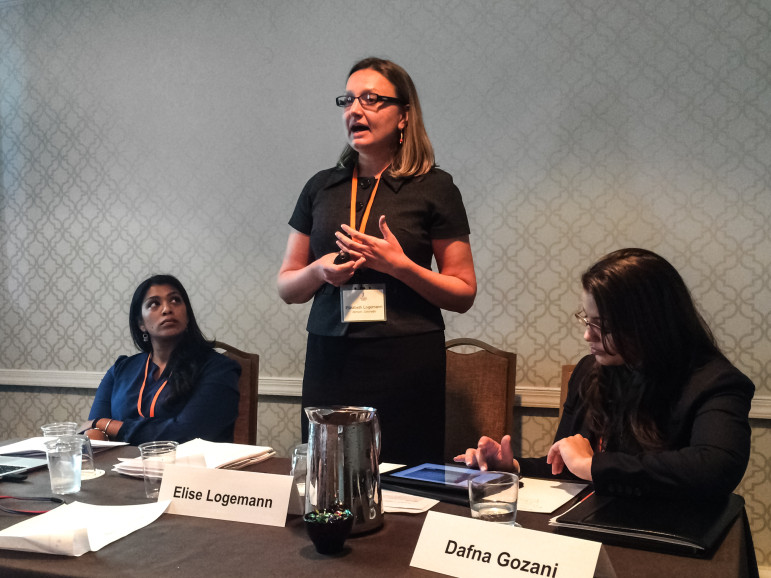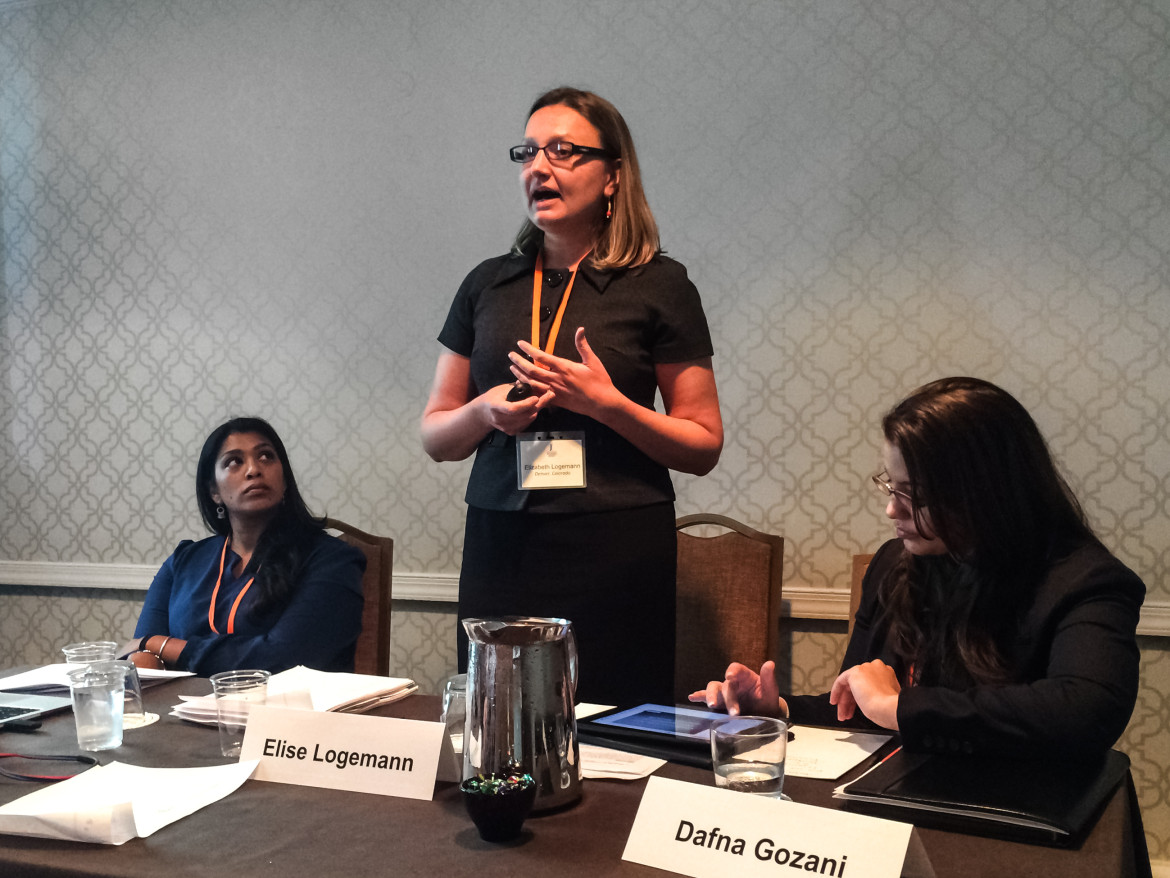
Jamaal Abdul-Alim
Riya Saha Shah (left), Elise Logemann (middle) and Dafna Gozani (right) at the annual conference of the Coalition for Juvenile Justice urged juvenile justice workers to seek reforms that would make it easier for young people to squelch delinquent acts from their pasts and move on with their lives.
WASHINGTON — Juvenile records can often have serious lifelong consequences — and the remedies of expunging or sealing the records are often too costly and too complicated to pursue.
That was the heart of the message that three juvenile defense attorneys delivered at the annual conference of the Coalition for Juvenile Justice recently as they urged juvenile justice workers to seek reforms that would make it easier for young people to squelch delinquent acts from their pasts and move on with their lives.
The push for change begins with recognizing that when a young person is found guilty of a particular offense, that finding may not be as “confidential” as some state laws would suggest, one speaker said.
“There’s this idea that, ‘This is just kiddie court,’ and it’s no big deal, and families and children think about it this way,” said Riya Saha Shah, staff attorney at the Philadelphia-based Juvenile Law Center. “They are given information that records disappear upon discharge from the case, and that it won’t be on your ‘permanent record,’ whatever that means,” she said.
“The truth of the matter is when a juvenile has been adjudicated delinquent, the consequences are quite severe. … we’re still treating them in a lot of ways like little adults.
States often confuse the meaning of sealing and expungement, Shah said.
 “Even if statutes said expungement shall occur five years after a juvenile’s case is discharged, and after expungement, only law enforcement has access, that’s not expungement,” Shah said. “That’s sealing, because even law enforcement shouldn’t have access to it.”
“Even if statutes said expungement shall occur five years after a juvenile’s case is discharged, and after expungement, only law enforcement has access, that’s not expungement,” Shah said. “That’s sealing, because even law enforcement shouldn’t have access to it.”
The records may be acquired by private companies or even the media. They can hurt young people’s chances of securing education, housing and employment, Shah and her co-panelists said.
“The ... biggest barrier that comes into play is getting employment,” Shah said. “The police collect a lot of information. All of goes into their database. Employers can contact state police or a private database, and get information.
“Even if it appears as ‘juvenile,’ employers may not be able to differentiate between juvenile and adult records, or maybe don’t care because they think a juvenile who commits a crime is the same thing as an adult who commits a crime,” Shah said. “There’s also education consequences.”
The Common Application, an online college application form used by hundreds of universities and colleges, asks specific questions about juvenile adjudications. Financial aid and public housing may not be offered, particularly if a person was found delinquent for a drug offense, she said.
Shah said juvenile adjudications can also make it difficult to get accepted into the military.
Other possible consequences, depending on the offense, include suspension or revocation of a driver’s license, bans from becoming a foster parent or adopting a child, and being precluded from certain jobs that require licensure.
Dafna Gozani, Equal Justice Works Fellow at the Colorado Juvenile
Defender Center, spoke of a 23-year-old client who — along with his girlfriend and newborn child — were denied public housing because he is listed on a sex offender registry for inappropriately touching a girl when he was 13 years old.
Things got worse, she said, when he moved into a hotel and erroneously thought he didn’t have to notify law enforcement.
“You have to register in five days if you move,” Gozani said. ‘Now, he has a failure to register case. He got arrested and lost his job.”
Elise Logemann, staff attorney at the Colorado Juvenile Defender Center, noted how the Sex Offender Registration and Notification Act, known as SORNA, requires juveniles to register as sex offenders if they were 14 or older at the time of the offense and if the offense involved the use of force, threat, drugging or rendering the victim unconscious.
“One of the major consequences kids face when they’re on the registry is stigma,” Logemann said.
In one study, she said, citing a Human Rights Watch report titled “Raised on the Registry,” 52 percent of youth offenders in sex offender registries experienced violence or threats of violence against themselves or family members that they directly attributed to their registration.
Nearly 85 percent experienced “negative psychological impacts,” and nearly one-fifth attempted suicide, Logemann said.
Even though juvenile registration is not required to be posted on the Internet under SORNA, many states still post the information online, she said.
A massive overhaul of the framework that governs juvenile records and deregistration may be distant, but there are more practical measures that advocates can seek at the state level, the attorneys said.
They suggested seeking smaller fixes, such as better notification schemes for expungement or sealing, and eliminating deregistration fees or requirements that an offender pay restitution in full before seeking an expungement.
Shah recommended making use of a scorecard — such as "Failed Policies, Forfeited Futures" — as a “tool for shaming” states into adopting juvenile record policies more favorable to young offenders.
“Legislators don’t want to be in the bottom of anything,” she said.

Pingback: อาชญากรรมและการลงทัณฑ์คนไร้บ้าน (1) - Penguin Homeless
This isn’t related to the sex offender’s registry, but I had a juvenile record for one case that I was found guilty of in family court. I had the record expunged when I turned 18. Now I am 44 years old. Several years ago I was accused of assault (I was found not guilty), and my lawyer said to the judge “My client *appears* not to have any prior convictions,” leading me to think that he was alluding to my expunged juvenile record. From what I hear even when it is expunged people can see that you have an expunged file. By the way, in my case it didn’t cost anything to have it expunged. I just had to make a formal request for them to do so. So, onto today… now I am looking into a few college programs that might eventually lead to licensure and the questionnaires to apply for licensure do ask if you were ever arrested, and to explain, and if you have a juvenile record and to explain (it says even if it was expunged.) Now I am worried if I can pursue the career choices I am interested in, even though these were matters that occurred almost 30 years ago!
My 17 yo son pleaded guilty to lessen a charge of a crime that he didn’t commit , He was tried as a juvenile but will have a strike on his adult record. He has never been in trouble with the law but because he had problems with truancies, graffiti they made him out to be this street thug.. How will he find a decent job with that record? Almost setting these kids up for failure for a mistake . He will do his time for being at the wrong place at the wrong time but pay forever??? Not right
And then there is my son in Texas. He plead guilty (bad decision) to a car jacking at age 18. The Prosecutor made a board of all his past crimes. The only thing is, he had never been convicted of anything before the carjacking. And she was lying. There was a little truth to some of the things but she was allowed to present it if he had even looked at a teacher funny, and she found it in school records, she put it on her board as one of Brandon’s past felonious crimes. He got 20 years for a car jacking where no one was hurt and in fact, he never pulled a weapon but he did show a knife to a lady. I recently found where a man by the name of Jesse MacLeay Ph.D. from Trinity University published an article about my son where he used everything this prosecutor Samantha DiMaio had said and claimed that my son would never be able to be rehabilitated and should have gotten a life sentence based on what he did as a juvenile. So his juvenile record was not only used to get him a very long sentence but also made public and written about for everyone to see even though there were no convictions and not much truth either. Talk about how hard he’s going to have it when he gets out.